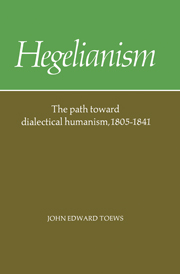Book contents
- Frontmatter
- Contents
- Preface
- Introduction: the Hegelian project in ideological perspective
- PART I PHILOSOPHY AND CULTURAL INTEGRATION: HEGEL IN CONTEXT
- PART II THE HISTORICAL APPROPRIATION OF THE ABSOLUTE: UNITY AND DIVERSITY IN THE HEGELIAN SCHOOL, 1805–1831
- PART III THE REDUCTION OF THE ABSOLUTE TO “MAN”: THE DIVISION OF THE SCHOOL AND THE EMERGENCE OF THE HEGELIAN LEFT, 1830–1841
- 7 Right, Center, and Left: the division of the Hegelian school in the 1830s
- 8 Strauss and the principle of immanence
- 9 Bruno Bauer and the reduction of absolute spirit to human self-consciousness
- 10 Feuerbach and the reduction of absolute spirit to human “species being”
- EPILOGUE: BEYOND “MAN” – THE RISE AND FALL OF LEFT HEGELIAN HUMANISM
- Notes
- Bibliography
- Index
8 - Strauss and the principle of immanence
Published online by Cambridge University Press: 08 January 2010
- Frontmatter
- Contents
- Preface
- Introduction: the Hegelian project in ideological perspective
- PART I PHILOSOPHY AND CULTURAL INTEGRATION: HEGEL IN CONTEXT
- PART II THE HISTORICAL APPROPRIATION OF THE ABSOLUTE: UNITY AND DIVERSITY IN THE HEGELIAN SCHOOL, 1805–1831
- PART III THE REDUCTION OF THE ABSOLUTE TO “MAN”: THE DIVISION OF THE SCHOOL AND THE EMERGENCE OF THE HEGELIAN LEFT, 1830–1841
- 7 Right, Center, and Left: the division of the Hegelian school in the 1830s
- 8 Strauss and the principle of immanence
- 9 Bruno Bauer and the reduction of absolute spirit to human self-consciousness
- 10 Feuerbach and the reduction of absolute spirit to human “species being”
- EPILOGUE: BEYOND “MAN” – THE RISE AND FALL OF LEFT HEGELIAN HUMANISM
- Notes
- Bibliography
- Index
Summary
In later years, Strauss looked back on the Life of Jesus as not only his most famous or notorious work but also his best book. Among all his writings, he felt, it was the one that could be described as a truly inspired work. “In his youthful survey of the state of knowledge in his discipline”, Strauss wrote, “the author, with the instinct of a person who is destined to lead the race one step forward, had come upon the crucial problem of his time, taken it into his innermost self, and thus provided it with the warmth and life that made it into a fertile seed for a new scholarly life”. The “crucial problem” was, of course, the relationship between faith and knowledge, religion and philosophy, between the world view of traditional Christianity appropriated in faith and expressed in symbolic or “representational” form and the world view of “modern consciousness” acquired through experience and reason and expressed in the form of philosophical knowledge. It was a problem that concerned the very foundations, the presuppositions, of human activity and cultural organization. During the three years following his departure for Berlin in November 1831, Strauss devoted all his intellectual energy to a simultaneous study of both sides of this problem, and in the summer of 1835 he presented his contemporaries with the two thick volumes that proposed a new model of reconciliation between the past and the present, between traditional Christian culture and modern consciousness.
- Type
- Chapter
- Information
- HegelianismThe Path Toward Dialectical Humanism, 1805–1841, pp. 255 - 287Publisher: Cambridge University PressPrint publication year: 1981



